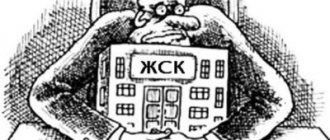Home / Real estate / Acquisition of real estate / Privatization
Back
Published: 01/28/2018
Reading time: 8 min
0
138
Registration of municipal apartments into personal ownership allows new owners to fully exercise their civil rights in relation to living space - sell, donate, exchange, etc. The procedure and duration of the procedure for registering rights depends on the status of the residents and the presence of encumbrances on the living space.
- Legislative regulation
- Who has the right to privatization?
- List of documents
- Algorithm for the procedure: Refusal or approval
- Registration of the right to an apartment
Legislative regulation
The procedure for the privatization of municipal apartments into the possession of citizens is determined by legislative act No. 1541 “On Privatization...”.
This regulatory act emphasizes that the transfer of municipal property to citizens is of a declarative nature, describes the procedure for registering rights for children under 18 years of age, and provides a list of premises that are not subject to privatization:
- emergency houses;
- dormitories;
- service rooms.
The free privatization period was supposed to end before the end of February 2020, but at the beginning of the month the issue of extending the deadline until 2020 for some categories of persons was considered. As a result, on February 22, Law No. 14 was adopted, according to which the free privatization of municipal housing became indefinite.
Who has the right to privatization?
The following categories of persons can privatize municipal housing:
- renting living space from the municipality under a social tenancy agreement;
- orphans living for more than 5 years in municipal apartments provided for free use;
- relatives of social rent tenants living with them in the same living space;
- children of a municipal housing tenant who are under 18 years of age and live separately, but are registered in municipal housing at birth.
It is important to take into account that citizens who previously took part in the privatization of an apartment or share lose the right to free privatization, according to Art. 11 of Law No. 1541. Ownership of residential real estate purchased on the secondary market, as well as social status, do not affect the approval of the transaction by the authorities.
Children under 18 years of age receive equal rights to social housing as other tenants.
List of documents
Before submitting an application to the Housing Department, you must prepare the following documents:
- cadastral document and registration certificate for the apartment;
- certificate of non-participation in privatization earlier;
- housing warrant;
- certificate of persons registered in the apartment;
- copies of applicants' identification documents.
If children are involved in the procedure, permission must be obtained from the social protection service. The renunciation of the rights of ownership of living space by individual residents must be certified by a notary on a special form. A certificate of non-participation in privatization can be obtained from the MFC, and a technical passport is issued at the BTI.
Procedure algorithm
Privatization of housing owned by the city administration is generally carried out as follows:
- Preparation of a registration certificate for an apartment in BTI.
- Determining the circle of persons from among those registered in the premises who claim a share in the apartment.
- Collection of necessary documents and certificates.
- Applying to the Housing Department with an application for privatization.
- Consideration of the application and making a decision to authorize privatization or refuse.
- If the decision is positive, a housing transfer agreement will be signed.
- Registration of the right to an apartment in Rosreestr.
Persons participating in privatization submit an application to the Housing Department through branches of Rosreestr or MFC.
The text of the application begins with the name of the receiving body, as well as the position and full name of the person authorized to consider applications for privatization.
The text should contain the following information:
- Full name and passport details of all privatization participants;
- address of the privatized housing;
- cadastral number;
- common and living areas;
- number and area of isolated premises;
- type of living space (communal or separate apartment, room);
- a list of all registered persons;
- information about the presence of utility debts or legal encumbrances.
For minors, the details of the birth certificate must be indicated, and the number and date of the administration’s decision to authorize the guardianship service for privatization under the stated conditions must also be entered.
Application form here.
Refusal or approval
During the consideration of the application, the housing department checks the completeness of the submitted documentation and the accuracy of the information in the application. A refusal may be received for one of the following reasons:
- incorrect filling out of the application;
- providing an incomplete package of documents or incorrect information;
- lack of right to privatization for some applicants;
- lack of permission from the guardianship service;
- imposition by the court of restrictions on transactions with this housing stock.
The restriction is imposed for a limited period; if housing has become the cause of property disputes, after the restriction is lifted, you can resubmit the application. Reasons for refusal must be communicated to applicants in writing.
If the decision is positive, the privatization participants are summoned to Rosreestr to conclude an agreement on the transfer of residential real estate; this document will be the title document for the privatized apartment.
The transfer agreement states that the municipal authority transfers the possession of the residential space specified in the application to the applicants on a free basis, after which the rights holders are listed, indicating the number of square meters transferred to each of them.
Registration of the right to an apartment
To register the right to an apartment, applicants apply to the Rosreestr office or the MFC with a registration application and documents:
- transfer agreement;
- copies of passports;
- technical passport for the apartment.
The application is filled out according to the Rosreestr form. Persons over 14 years of age sign the paper on their own, and a legal representative signs for young children.
Registration takes from 5 to 7 days, after which new owners can receive an extract from the Unified State Register of Real Estate as proof of ownership of the living space.
Housing privatization: everything you need to know
The head of the housing policy department of the Minsk City Executive Committee, Alexander Avramenko, told a correspondent of the Minsk-Novosti agency about the timing and procedure for the privatization of residential premises.
According to Decree of the President of Belarus dated December 16, 2013 No. 563 “On some issues of legal regulation of housing relations,” the republic will complete the privatization of residential premises of the state housing stock on June 30, 2020. From July 1, non-privatized apartments, according to Decree 563, will be included in commercial (rental) apartments.
What does it mean to privatize housing before July 1
Until this date, citizens can exercise the right to privatization.
“Before July 1 (the last day is June 30), it is necessary to submit an application for privatization and relevant documents to the district administration or to the organization that has economic or operational management of the housing,” explained A. Avramenko. “That is, it is important to understand that you do not need to complete the privatization process within the established time frame, but start it - submit an application and other necessary documents. And this will be enough to catch the proverbial last carriage. Decisions on the privatization of residential premises based on applications submitted after June 30, 2016 will not be made.
The process of privatization of residential premises is regulated by:
— Chapter 23 of the Housing Code of the Republic of Belarus;
— Law of the Republic of Belarus “On the privatization of state property and the transformation of state unitary enterprises into open joint-stock companies”;
— Decree of the President of Belarus No. 563 “On some issues of legal regulation of housing relations”;
— Decree of the President of Belarus No. 524 “On the privatization of residential premises of the state housing stock.”
It is important to take into account that changes and additions have been made to these regulations, so you should be guided by the current versions.
Which housing can be privatized and which cannot?
Privatization objects are residential premises of the state housing stock, provided to citizens in the prescribed manner on the basis of a rental agreement, including individual houses, service apartments (subject to appropriate conditions).
According to Art. 135 of the Housing Code, residential premises are not subject to privatization
— social use;
— state housing stock in dormitories;
— special service housing stock;
— commercial use;
- located in residential buildings being reconstructed or overhauled, in the case of reconstruction and (or) redevelopment of apartments during reconstruction or major repairs of a residential building - for the period from the beginning of the work to its completion;
- occupied by military personnel leaving the Republic of Belarus to perform military service in the armed forces of other states, or by family members of such military personnel, and some other residential premises.
Who has the right to privatize housing
“All family members registered in it have the right to privatize residential premises of the state housing stock,” said A. Avramenko. — The same applies to citizens living in service apartments and having the right to purchase this housing as of March 31, 2014.
Who should apply
As A. Avramenko explained, when submitting an application for privatization, the presence of the tenant, adult members of his family, as well as other citizens, who, in accordance with the law, retain an equal right to own and use residential premises with the tenant, must be present. If they do not have the opportunity to be present in person, they must provide their written consent to the privatization of the apartment by the applicant, certified by a notary.
What other documents are needed?
Their list is determined by Decree of the President of Belarus dated April 26, 2010 No. 200 “On administrative procedures carried out by government bodies and other organizations upon applications from citizens.”
It includes:
— application for privatization of residential premises (samples can be found in the body or institution on whose balance sheet the apartment or house is located);
— original passports of all adult family members (it is advisable to have photocopies);
— birth certificates of minor family members (if any);
- a certificate describing the apartment (you can arrange it in advance yourself or order it when submitting an application - the service is paid);
— “Housing” checks, if available. They will be accepted to pay off the calculated cost of privatization of residential premises. Only checks made directly to the applicant or given to him by close relatives - spouse, parents, children, adoptive parents, adopted children, siblings, grandparents, grandchildren - can be used.
Where to contact
The application for privatization and the relevant documents must be submitted to the administration of the district in which the apartment or house is located, or to the organization in whose economic control or operational management the housing is located.
What determines the cost of privatization?
“The cost depends on several factors,” noted A. Avramenko. — For example, it depends on whether the building where the apartment is located has been reconstructed. Its consumer qualities are taken into account - floor, ceiling height, presence of a balcony, etc. In addition, the environmental quality index and the degree of wear and tear of the house are taken into account. All this is calculated by the relevant specialists of the district administrations.
To whom and what benefits are provided?
Preferential privatization is provided for certain categories of citizens . These include Heroes of Belarus, Heroes of the Soviet Union, Heroes of Socialist Labor, victims of political repression and other citizens. The full list of categories is specified in Art. 140 of the Housing Code of the Republic of Belarus.
How long does the privatization process take?
“According to the law, 1 month is allotted for such an administrative procedure as privatization,” A. Avramenko clarified. — After this, it will be necessary to have the privatization agreement certified by a notary and visit the BRTI to register ownership of the apartment. If the contract is not certified by a notary, the decision of the district administration on privatization will be canceled after a year. It is valid for 1 year. Therefore, I repeat, during this time it is necessary to conclude and notarize the specified agreement with a notary and pay at least 10% of the cost of the privatized apartment. The remaining amount is allowed to be paid over 40 years. If service housing is privatized, then within 20 years. At the same time, the cost of housing remains unchanged throughout the entire installment period.
Is it possible to privatize a social apartment?
“Social housing is not subject to privatization,” noted A. Avramenko. — And it won’t become a rental property after June 30. Therefore, citizens who live in social apartments provided to them have no reason to worry.
What will happen if housing is not privatized?
The residential premises of the state housing stock that remained non-privatized before July 1 are subject to inclusion in the composition of residential premises for commercial use, after which the amount of payment for their use will be established using a reduction factor of 0.2. But this is subject to the residence of registered citizens who were previously provided with this housing. At the same time, their employers will have to not only pay rent in addition to payments for housing and communal services (HCS), but always do it on time. The presence, without good reason, of a two-month debt in payment for the use of a rental apartment and (or) for housing and communal services may become the basis for termination of the rental agreement with the subsequent eviction of the debtor and family members living with him without the provision of other living space.
What to do if there is no money for privatization and there is also nothing to pay for rental housing
“You can transfer your apartment to social housing if you belong to the category of persons entitled to such an apartment,” explained A. Avramenko. — Otherwise, I recommend contacting the Committee on Labor and Social Protection of the Minsk City Executive Committee, where they will consider the situation in detail and help you make the right decision.
Timing and costs
Registration of a technical passport takes up to 10 days, and consideration of the application cannot last longer than 60 days (Article 8 of Law 1541). When participating in the privatization of children, the total duration of the procedure is increased by 2-3 weeks to obtain permission from the guardianship service.
The state duty for free privatization of housing is not charged , according to Art. 7 of Law No. 1541, but registration of a technical passport at the BTI is a paid service, the cost of which is 1500-2500 rubles.
Thorough preliminary preparation will help speed up privatization, for example, checking the presence of an illegal redevelopment act in order to avoid refusal after considering the application for a long time.
You can simplify and speed up the collection of documents by contacting a law firm, whose specialists will organize the collection, execution and submission of documents by proxy in a short time. The cost of legal services is 3,000-10,000 rubles.
You will learn how sick leave is paid in our thematic material. Proper payroll calculation is very important. Find out about the important nuances of this process in our professional article.
Did your business trip fall on a weekend? Study this material!
Is it necessary to privatize an apartment in 2017
The procedure is simple. You need to visit several authorities and collect papers. It will take 3 months (not taking into account the time of collecting and preparing documents). The application is considered within 60 days, and private property is registered within 1 month. How much it costs to privatize an apartment is a separate question. The procedure is free, but certificates are paid and can cost 100, 500, 700 rubles. Expenses are limited to 3000 - 5000 thousand, depending on the situation.
If you, having carefully considered the issue of the need for privatization, have come to the conclusion that it is necessary, be prepared to go through the following steps:
- Find out whether the housing where you live can be privatized (read the laws and go to the housing department).
- Inform people registered in the same apartment about your desire and discuss their participation in the process. If someone does not want to participate, they write an unaddressed refusal (registration by a notary will cost 500 rubles).
- Determine whether you will register sole or common ownership (this determines who will be able to manage housing in the future and how).
- Go to BTI. Employees will inspect the premises, determine if there are accidents, and whether there are any extensions or alterations. After which, if everything is in order, a technical passport will be issued.
- Collect a package of documents (the longest and most labor-intensive stage).
- Write an application for privatization at the housing department of the city administration (or village).
- Wait for the application to be reviewed.
- After the decision is made, sign an agreement for the transfer of housing into private ownership.
- Submit documents to Rosreestr in order to receive a certificate of registration of property rights in 1 month (if the registration process lasts a long time and exceeds 1 month, you have the right to appeal to a higher authority with a complaint).
Whether an apartment should be privatized is something everyone decides for themselves.
Differences between privatized and non-privatized living space:
- A privatized apartment is your property and you have the right to do whatever you want with it: donate, change, sell, hang up, remodel it, etc., this does not require permission from the state.
- In the event of the death of the owner, the privatized living space is inherited by relatives who have legal grounds for this, and the non-privatized one is returned to the state (the heirs, if they have lived with the owner all these years and are registered, can live, but under the same conditions).
- For private housing, in addition to rent, you have to pay mandatory contributions for major repairs and taxes.
- During preferential relocation, the owners of a privatized apartment are allocated housing of the same size as it was, regardless of the number of registered persons. And those who did not privatize the apartment receive new living space at the rate of 18 square meters (relevant for Moscow) for each person registered.
- If there are debts on loans, a privatized apartment can be forcibly taken to pay off the debt, but a public apartment cannot.
Important points
Privatization of housing free of charge is permissible only once in a lifetime, but the exception is for persons who took part in privatization under 18 years of age. Upon reaching the age of majority, such persons retain the right to one-time privatization (Article 11 of Law No. 1541).
It is important to take into account that consent to the privatization of the housing of neighbors living in the same apartment with the applicant is not required if the initiator of privatization formalizes the rights only to the share due to him. A ban on privatization at the request of neighbors is possible only if the neighbors prove that the registration of property rights by the applicant violates their legitimate interests.
When registering rights to municipal housing by a married person, the living space is privatized into the joint ownership of the spouses, regardless of the date of receipt of the residence order.
After the privatization of housing, the participants specified in the application become the owner of the apartment, the living space passes to them from the municipal owner under a transfer agreement.
How to deprivatize an apartment
If your opinion has changed or circumstances have changed, the apartment can be deprivatized, but with the condition of complete loss of the right to re-privatize an already deprivatized apartment. Everyone has their own reasons. You should know the difference:
- deprivatization - people of their own free will return their housing to the state;
- deprivatization - return to state ownership is carried out by court decision (cancellation of privatization in case of violation of laws).
- Deprivatized housing should not be inherited.
- After the privatization procedure, housing was not exchanged and did not appear in purchase and sale transactions.
- The apartment has not been seized and is not listed as collateral from the bank.
- After privatization, people were not registered.
If the above conditions are met, you can deprivatize the apartment yourself. The process and collection of documents is similar; the list of required documents is supplemented by a certificate stating that the deprivatized housing is not under pledge or arrest.







